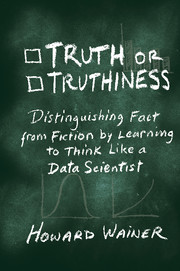Book contents
- Frontmatter
- Dedication
- Contents
- Preface and Acknowledgments
- Introduction
- Section I Thinking Like a Data Scientist
- 1 How the Rule of 72 Can Provide Guidance to Advance Your Wealth, Your Career, and Your Gas Mileage
- 2 Piano Virtuosos and the Four-Minute Mile
- 3 Happiness and Causal Inference
- 4 Causal Inference and Death
- 5 Using Experiments to Answer Four Vexing Questions
- 6 Causal Inferences from Observational Studies: Fracking, Injection Wells, Earthquakes, and Oklahoma
- 7 Life Follows Art: Gaming the Missing Data Algorithm
- Section II Communicating Like a Data Scientist
- Section III Applying the Tools of Data Science to Education
- Section IV Conclusion: Don't Try Th is at Home
- Bibliography
- Sources
- Index
6 - Causal Inferences from Observational Studies: Fracking, Injection Wells, Earthquakes, and Oklahoma
from Section I - Thinking Like a Data Scientist
Published online by Cambridge University Press: 05 December 2015
- Frontmatter
- Dedication
- Contents
- Preface and Acknowledgments
- Introduction
- Section I Thinking Like a Data Scientist
- 1 How the Rule of 72 Can Provide Guidance to Advance Your Wealth, Your Career, and Your Gas Mileage
- 2 Piano Virtuosos and the Four-Minute Mile
- 3 Happiness and Causal Inference
- 4 Causal Inference and Death
- 5 Using Experiments to Answer Four Vexing Questions
- 6 Causal Inferences from Observational Studies: Fracking, Injection Wells, Earthquakes, and Oklahoma
- 7 Life Follows Art: Gaming the Missing Data Algorithm
- Section II Communicating Like a Data Scientist
- Section III Applying the Tools of Data Science to Education
- Section IV Conclusion: Don't Try Th is at Home
- Bibliography
- Sources
- Index
Summary
Introduction
On November 11, 1854, Henry David Thoreau observed, “Some circumstantial evidence is very strong, as when you find a trout in the milk.” He was referring to an 1849 dairyman's strike in which some of the purveyors were suspected of watering down the product. Thoreau is especially relevant when we are faced with trying to estimate a causal effect, but do not have easily available the possibility of doing a suitable experiment, and so are constrained to using available data for an observational study.
In Chapters 3 and 4 we saw how the key to estimating the causal effect of some treatment was comparing what occurred under that treatment with what would have occurred without it. In Chapter 5 we showed how the structure of a randomized, controlled experiment was ideally suited for the estimation of causal effects. But such experiments are not always practical, and when that is the case we are constrained to use an observational study, with naturally occurring groups, to estimate the size of the causal effect. When we do not have randomization to balance the treatment and control groups we must rely on some sort of post hoc matching to make the equivalence of the two groups credible. Results from observational studies must rely on evidence that is circumstantial, and the strength of such evidence is what determines how credible the conclusions are.
The balance of this chapter deals with a single remarkable example, an exploration of a possibly causal connection between oil and gas exploration and earthquakes. More specifically, we will explore the consequences of the unfortunate combination of using a drilling technique called hydraulic fracturing (commonly called fracking) and the disposal of wastewater by the high-pressure injection of it back into the earth. I believe that the available evidence is, in Thoreau's delicious metaphor, a trout in the milk.
Dewatering
An oil well is considered to be exhausted when the amount of oil it yields is no longer sufficient to justify the cost of its extraction. Most of Oklahoma's wells fell into this category by the 1990s because of the immense amount of wastewater that was brought up along with the diminishing amount of oil. But in the twenty-first century the combination of dewatering technologies and the rising price of oil made many of Oklahoma's abandoned wells economically viable again.
- Type
- Chapter
- Information
- Truth or TruthinessDistinguishing Fact from Fiction by Learning to Think Like a Data Scientist, pp. 61 - 71Publisher: Cambridge University PressPrint publication year: 2015



